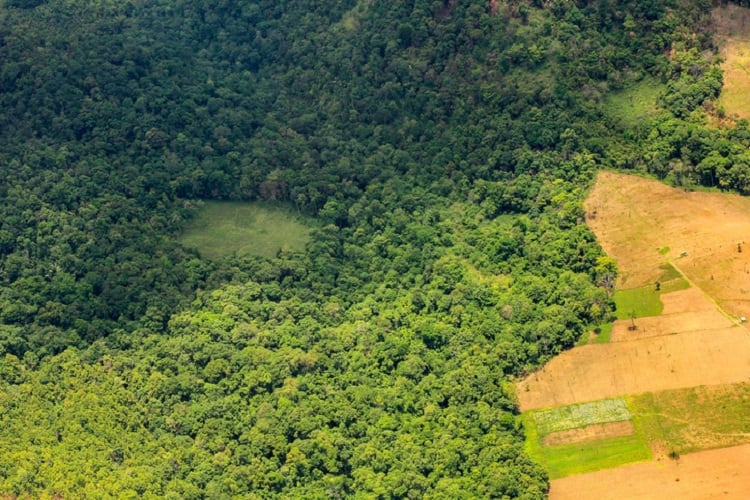Certification alone has not helped companies meet their 2020 pledges to eradicate deforestation from their supply chains.
This is the premise of Greenpeace’s ‘Destruction: Certified’ report, published earlier this week, which analysed certification labels on cocoa, coffee, biofuels, palm oil, soy and wood.
Specifically, the environmental NGO compared certification bodies Fairtrade, Rainforest Alliance, the Round Table on Responsible Soy (RTRS), Forest Stewardship Council (FSC), and the Roundtable on Sustainable Palm Oil (RSPO), among others, to assess their effectiveness in addressing deforestation, forest degradations, ecosystem conversion, and associated human rights abuses.
Greenpeace surmised that some of these schemes have ‘major failings’. “The conclusion thus is that certification is a weak tool to address global forest and ecosystem destruction,” noted the NGO. “Currently, certification enables destructive businesses to continue operating as usual.”
Going one step further, Greenpeace suggested certification risks increasing the harm caused by the expansion of commodity production, by bolstering the image of forest and ecosystem risk commodities and consequently stimulating demand. “Certification schemes thus end up greenwashing products linked to deforestation, ecosystem destruction and rights abuses.”
While Greenpeace critiqued a range of sectors, palm oil advocates have interpreted the report as an attack on palm oil and palm oil certification.
Greenpeace accused of using palm oil as ‘cannon fodder’
According to pro-palm oil platform Palm Oil Monitor, Greenpeace mentions palm oil almost twice as often as soybean in the report, and more than four times as often as wood.
This is unjustified, implied Palm Oil Monitor, stressing that the deforestation footprint of soybean is ‘basically double that of palm oil’. Further, private sector commitments to deforestation-free supply chains in the palm sector ‘outstrip all other commodities’, it added.
Palm Oil Monitor also noted a lack of criticism for other sectors associated with deforestation. “There is absolutely zero criticism of certification schemes for other crops such as maize, which has a higher deforestation footprint than palm oil.”
The pro-palm oil advocate continued: “The bull in the room is that certification of livestock simply is not mentioned at all; and we shouldn’t have to remind that the livestock deforestation footprint is roughly 10 times that of palm oil.”
Greenpeace is clear in its intentions, stating that the report aims to assess the effectiveness of certification, and inform decision making by governments and companies on what role certification can play in ‘cleaning up’ supply chains.
From Palm Oil Monitor’s perspective, the NGO is attempting to ‘lobby politicians’ – using palm oil as ‘cannon fodder’ in the process.
What role should certification play in due diligence legislation?
The European Commission is preparing to introduce a legislative initiative on mandatory deforestation due diligence for companies as early as mid-2021. This could mean that legislation is applied to all actors in the supply chain, be they suppliers, traders, distributors, or FMCG brands.
While there are different ways businesses can prove due diligence, it has been suggested that third party certification could play an important role. In June last year, European Palm Oil Alliance (EPOA) chair Frans Claasen said regulatory measures should and can be built on the successes and experiences of certification schemes like RSPO.
Greenpeace does not agree. In its report recommendations, Greenpeace noted: “Governments and legislators must not accept certification schemes as a way to demonstrate compliance with legal requirements related to the protection of forests, ecosystems and human rights…a sound regulatory approach must be based on the requirement for companies to provide, under their own responsibility, reliable and verifiable evidence that their supply chains and products are free of deforestation, ecosystem conversion, degradation of forests and other ecosystems and human rights violations.”
Certification bodies respond
Concerning the role of certification in long-term sustainability, Greenpeace does not believe such schemes should be relied on to ‘deliver change’ in the commodity sector.
“At best, it has a limited role to play as a supplement to more comprehensive and binding measures. Following fundamental reforms, including strengthened standards and full transparency, certification can play a role to help life environmental and social performance on the ground.”
RSPO agreed that certification alone is not a magic solution. “We…recognise that we cannot solve the problem of deforestation alone,” noted the certification body in response to the report.
“This requires collaboration and a shared effort across agricultural commodity industries and supply chains with governments and NGOs in all producing and consuming countries, as we have advocated for in the European Union last year.”
Soy certification body RTRS was also in agreement. “Voluntary certification schemes, as part of a multi-stakeholder approach, are an important part of the solution, but cannot be viewed as the silver bullet to tackle the deforestation challenge," the membership organisation noted in response to the report.
Rather, RTRS believes the ‘full contribution and potential’ of voluntary certification schemes should be interpreted in a broader context, “as a complementary instrument in a mix of more comprehensive and representative multisectoral approach.
“That certification is the only approach or solution to deliver deforestation-free supply chains to help tackle climate change is no longer a sustained assumption. RTRS believes that by looking at the certification initiative s in isolation, much of their impact is under-valued.”
The certification body continued: “As such, the report is attributing the responsibility for halting deforestation to the individual schemes, without taking into consideration the broader framework these schemes operate in.”



